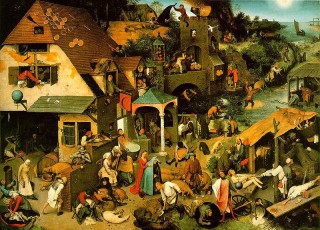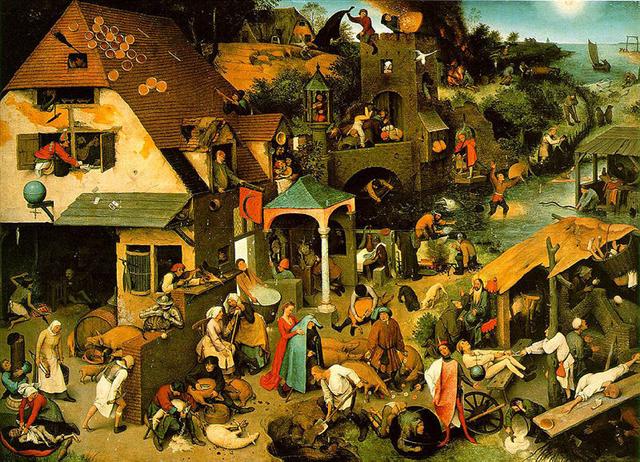
Just a matter of time before Americans begin asking what the Egyptian revolution means for them—Americans, the unthinking rabble who matter.
Economists are there to deliver the imperialist [and dumbed-down] perspective on the revolution after Americans dig out from a major blizzard and check their betting pools on the Super Bowl. So we can get back to business as usual in case this democracy craze were to cause some inconvenience.
For an amusing aside, read President Obama’s remarks which make clear that Mubarak has become a decided inconvenience … to us. President Obama uses the word, “change,” three times.
Perhaps readers can be forgiven for not taking that word at face value any more. Allusions to change seem more convincing coming from millions of Egyptians in the street.
From Nouriel Roubini’s Global Economics.
By Rachel Ziemba and Ayah El Said
Editor’s note: For our most up-to-date coverage of the rapidly changing events in the Middle East and North Africa, see these RGE Critical Issues: “Mubarak Pledges Not to Run Again: Will it Be Enough for the Protestors?” “Will Ripples From Tunisia and Egypt Spread Through Middle East Governments and Markets?”
Egypt’s future continues to hang in the balance. In a speech on February 1, President Hosni Mubarak announced that he will not run in the 2011 presidential elections and called for constitutional changes to allow for more democratic polls. Unimpressed with these promises—along with Mubarak’s previous moves to replace his cabinet and introduce a vice president for the first time in his 29-year rule—the protestors continue to call for his ouster.
Egypt’s political direction could have profound effects on regional stability—potentially involving, for example, the Israeli-Palestinian conflict and efforts to contain Iran’s nuclear ambitions—with broad economic and financial ramifications. In “Egypt: Assessing the Ripple Effect,” we survey the implications of the continuing unrest in Egypt and identify the most vulnerable countries in the Middle East and North Africa (MENA) region. The recent economic and political developments do not bode well for Egypt’s debt, and this contagion could continue to spread within the region, leading to the persistent underperformance of local currency debt and equity markets. As we highlighted in a recent MENA Focus, political stresses in Egypt have pushed other vulnerable governments in the region to promise political reforms and increased government spending, which some of the oil importers, like Jordan, can ill-afford. We believe, though, that investors will continue to give special treatment to the region’s strongest economies, such as the small GCC countries, where wealth and government resources reduce some of the economic stresses.
Regarding wider implications, the oil market remains the key link between instability in the Middle East and the global economy. Although we see very little risk of an oil-supply shock through the Suez Canal— the canal and adjoining pipeline appear to be under the control of the armed forces—prolonged uncertainty could further pressure oil market sentiment in the short term, which more OPEC production could only partly offset. Further increases in the oil price above the US$100 per barrel mark could pose a significant risk to the global economy, as RGE Chairman Nouriel Roubini recently reiterated.
In Egypt itself, continuing unrest implies extreme downside risks for domestic growth, even under the most optimistic political scenario (outlined in “Political Upheaval on the Nile: Four Risk-Laden Outcomes”). At a minimum, we expect growth to slow significantly in the first quarter of 2011 from the 6.2% y/y pace of the fourth quarter of 2010, due to factory and bank shutdowns, a decrease in tourist inflows and ongoing curfews. As such, we expect growth for the year to come in well below the 5.9% we predicted in our 2011 Outlook, as almost all components of domestic demand will be adversely affected.
With the fiscal deficit widening, the increase in financing costs will temper growth and investment, hampering the government’s efforts to respond to the economic grievances that fueled the unrest. For the moment, Mubarak has returned to the old playbook: subsidies, subsidies and more subsidies, urging food price cuts and maintaining government price supports. Looking beyond the current stall, boosting employment and overall economic growth will dominate the policy agenda, and we expect the government to shift even more toward expansionary policy to support economic growth. Fiscal spending will increase, even though revenues will fall.
As fiscal expansion is constrained by a fiscal deficit over 8% of GDP, most support will come from the monetary policy side. We expect rate hikes to be further delayed as the government relies on subsidies to dampen price pressures. The depreciation bias to the EGP should remain as well, to support exports and competitiveness. Given the short-term risk of capital flight, the Central Bank of Egypt will be forced to use some of its official and unofficial reserves, but a weak pound will remain a key part of the policy mixture, as outlined in our latest Emerging Markets Quarterly.
ATTENTION READERS
We See The World From All Sides and Want YOU To Be Fully InformedIn fact, intentional disinformation is a disgraceful scourge in media today. So to assuage any possible errant incorrect information posted herein, we strongly encourage you to seek corroboration from other non-VT sources before forming an educated opinion.
About VT - Policies & Disclosures - Comment Policy




